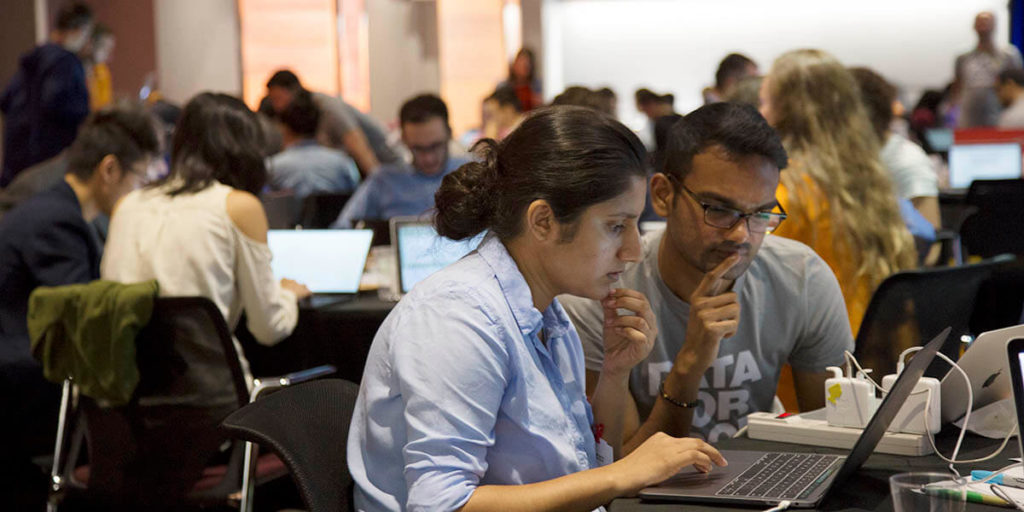How Elsevier is helping charities use data for good

Data scientists and other technologists work pro bono on projects for inclusive development at a DataDive event in New York. (Photo by Alison Bert)
Data is a powerful resource, and for many years now Elsevier has used it to deliver insights and support policy and decisions in the worlds of health and research, not least with initiatives such as the recent Melanoma report, Research Futures report, and AI report, all released in the past seven months.
Of course, not every organization has the capabilities and expertise to unlock insights from data, which is one of the reasons The Elsevier Foundation supports the Datakind DataDive events, which seek to help charities and non-profits unlock the power of data. They do this by drawing on the expertise of staff at companies that do have that capability – like Elsevier.
What’s a DataDive?
A DataDive is a marathon-style 48-hour event where nonprofits work with teams of 100 data scientists, developers and designers to solve key issues in their communities and create real change. We’re looking for colleagues to join and guide these organizations gaining insight of their data.
Read what Paola, Felipe and Jessica had to say about their experience at the London DataDive in November 2018 – where 130 volunteers worked with 4 nonprofits in the largest event DataKind has ever organized
At her first DataDive in 2017 Paola Barr, Publishing Support and Insights Specialist, was fresh from a quick course on Python and wanted to explore a data analysis that would be deeper than the one she normally performs on her daily job. In 2018, the DataDive in London gave her the opportunity to put her new skills into practice, and to benefit from the knowledge of other volunteers who could give her tips and help her when she was stuck on a problem. “I like data!” she laughs “and this is a fantastic place to meet incredible people who can do all sort of things with data, things that I can only dream of. And it’s an incredible opportunity to do something for such impressive nonprofits.”
“The expertise I employ in my daily job is not often seen as a ‘charitable’ skill,” said Luis Felipe Villalobos, a Software Engineer. “Web development and data engineering are not immediately associated with social work. This is an opportunity to use the skills that I use at Elsevier to actually give back,” Felipe continues, “and develop tools the nonprofits will be able to keep using to find their own insights and make their own analysis. It’s satisfying.” When asked what he enjoys the most about the DataDive, he immediately pointed at the number of participants. “I just love to see such a diverse group of people coming together for a good cause. That’s my favorite part, being able to work with people from diverse backgrounds and having the opportunity to understand different perspectives.”
Jessica Miles might not be a data scientist, but is certainly a data enthusiast, and in her daily job she manages the Cell Symposia. For her, one of the most interesting parts about working with the nonprofits is that their data is not set up in a rigorous and scientific way. There is a lot of creativity involved in taking what’s available and provide actionable insights, and that’s something she feels she can take back to her daily job. “It’s been a treat to meet new people that I would not have met otherwise. It’s a passionate and engaged group, and it’s been great to be put in a situation where I can immediately make an impact even with a limited amount of time” Jessica says. “It’s also a great opportunity to hear what others are doing and the problems they’re solving – there are a lot of synergies and skills to be learnt – and to me, this networking aspect is extremely valuable.”

















